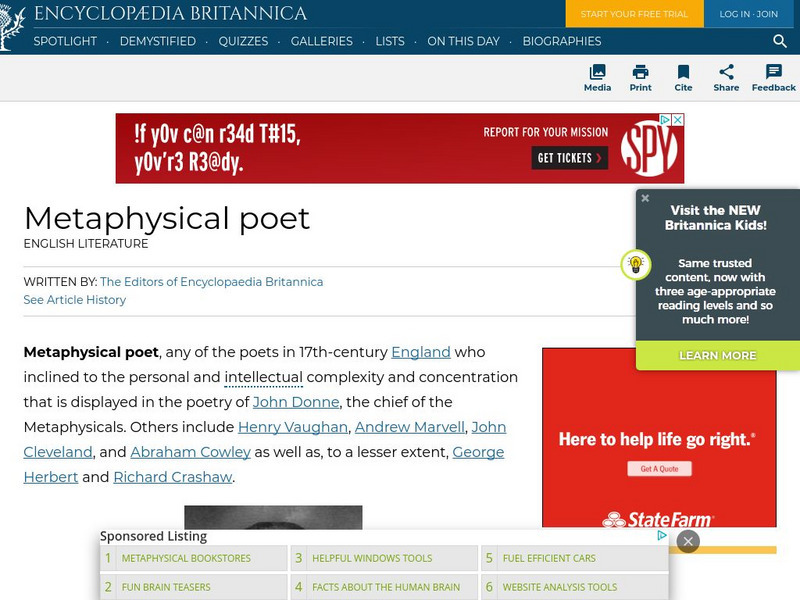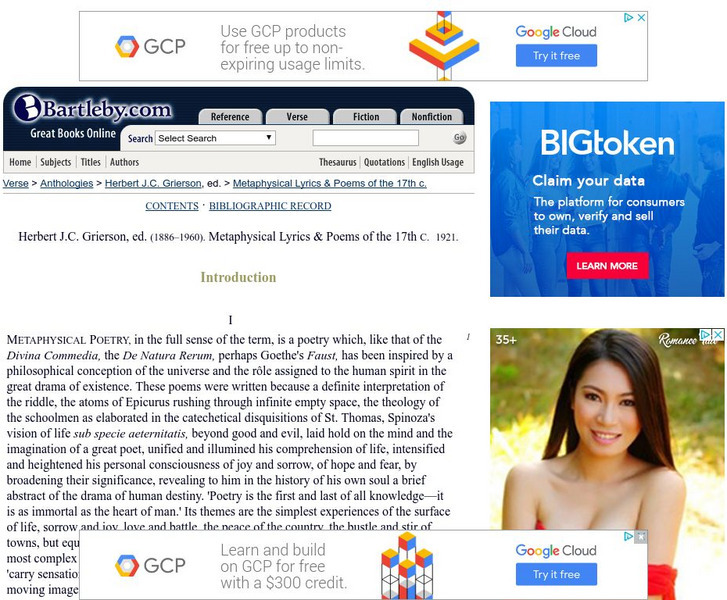MENSA Education & Research Foundation
Death Be Not Proud
Not dreadful, but mighty, this worksheet for “Divine Sonnet X” (aka “Death Be Not Proud”) models for individuals how to recognize John Donne’s argument for why Death should not be proud and how to recognize the sonnet structure and rhyme...
Luminarium
Luminarium: Anthology of English Literature
This site provides a selection of major authors and works associated with English literature, ranging from Geoffrey Chaucer to Sir Isaac Newton. Each author's page contains online texts of the author's works, essays about the author and...
Other
Cal Poly Univ.: Metaphysical Poetry & English Composition
A wonderful essay by Steven Marx of Cal Poly University about teaching metaphysical poetry. Gives insight to the literary style and the poets Donne, Herbert, and Marvell.
University of Toronto (Canada)
University of Toronto: Poetry of Henry Vaughan
This site indexes a full-text of 11 of Henry Vaughan's poems. Also included is some biographical information.
Bartleby
Bartleby.com: Henry Vaughan, the Retreat
Bartleby provides the full text for the following poems: "The Retreat", "Peace", "The Timber", and "Friends Departed".
Encyclopedia Britannica
Encyclopedia Britannica: Metaphysical Poet
This is an encyclopedia artical about the 17th century metaphysical poets: John Donne, Henry Vaughan, Andrew Marvell, John Cleveland, Abraham Cowley, George Herbert and Richard Crashaw. It offers links to more informatation about each of...
Other
Fu Jen Catholic University: Metaphysical Poetry
This site from the Fu Jen University describes the term "metaphysical" and gives history and definition of the term "metaphysical poet" as coined by critic Samuel Johnson.
Other
Poets' Corner: John Donne's Holy Sonnets
There are nineteen of John Donne's sonnets at this page. There is no commentary or other explanatory information.
Other
Fu Jen University: Metaphysical Poetry
This article by Dr. Marguerite Connor focuses on metaphysical poetry and the metaphysical poets. It includes a definition, the characteristics, a discussion of metaphycial poets and poetry, Neo-Platonism, platonic love, and T.S. Eliot's...
University of Toronto (Canada)
University of Toronto: Selected Poetry of Andrew Marvell
Get a taste of the metaphysical style by reading selected works of Andrew Marvell, noted metaphysical poet of the 17th century.
Bartleby
Bartleby.com: Metaphysical Lyrics & Poems of the 17th Century.: Donne to Butler
An introduction to J.C. Herbert Grierson's book, Metaphysical Lyrics & Poems of the 17th Century. This provides a good explanation of metaphysical poetry as a type, and you can access the rest of the book which is a collection of the...
Academy of American Poets
Poets.org: John Donne
This site, from the Academy of American Poets, features a detailed profile of John Donne as the founder of the Metaphysical Poets. Includes selected bibliography, related links, full text examples, and a portrait.
Other
Poems for the People: The Retreat by Henry Vaughan
This site provides the text of "The Retreat" by Henry Vaughan in its entirety.
Academy of American Poets
Poets.org: A Brief Guide to Metaphysical Poets
Concise explanation of the term "metaphysical poetry." It's mainly a discussion of the seventeenth century poetic movement, but it also includes some information about John Donne and other specific poets.
Washington State University
Washington State University: American Authors: Notes on Anne Bradstreet
Learn interesting facts about Anne Bradstreet (c. 1612-1672 CE) and her writing. The notes provide good background information to accompany reading and studying of her works.
















